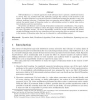107
click to vote
CORR
2010
Springer
15 years 2 months ago
2010
Springer
Self-stabilization is a versatile approach to fault-tolerance since it permits a distributed system to recover from any transient fault that arbitrarily corrupts the contents of a...
116
click to vote
EUROSYS
2006
ACM
15 years 5 months ago
2006
ACM
This paper describes and evaluates Fireflies, a scalable protocol for supporting intrusion-tolerant network overlays.1 While such a protocol cannot distinguish Byzantine nodes fro...
107
click to vote
WDAG
2007
Springer
15 years 8 months ago
2007
Springer
Consider a distributed network of n nodes that is connected to a global source of “beats”. All nodes receive the “beats” simultaneously, and operate in lock-step. A scheme ...
107
click to vote
SSS
2007
Springer
15 years 8 months ago
2007
Springer
Abstract. “Pulse Synchronization” intends to invoke a recurring distributed event at the different nodes, of a distributed system as simultaneously as possible and with a freq...
108
click to vote
ICC
2008
IEEE
15 years 8 months ago
2008
IEEE
—In unreliable and untrustworthy systems, information dissemination may suffer network failures and attacks from Byzantine nodes which are controlled by traitors or adversaries, ...

